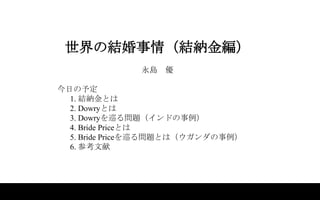
世界の結婚事情(結納金編)
- 1. 世界の結婚事情(結納金編) 永島 優 今日の予定 1. 結納金とは 2. Dowryとは 3. Dowryを巡る問題(インドの事例) 4. Bride Priceとは 5. Bride Priceを巡る問題とは(ウガンダの事例) 6. 参考文献
- 2. 1. 結納金とは / Wealth Transfer Occasioned by Marriage Wealth Transfer Occasioned by Marriage: 結婚に行われる資産の移転(Bell, 1998) o 誰が、誰に対して資産を移転するのかにより分類される(Papps et al, 1983) o 経済社会の仕組みと関連していると考えられる(Botticini and Siow, 2003) o 所有権や遺産相続の仕組み (Goody, 1973; Arunanchalam and Logan, 2016 etc.) o 農業生産の特徴 (Hakansson, 1989; Botticini and Siow, 2003 etc.) o 結婚の形態や人口動態 (Gaspart and Platteau, 2010; Mbaye and Wagner, 2013 etc.) o 今日扱うのは現在多くみられる形態であるDowryとBride Price
- 3. 誰が誰に対して資産を移転するのかによって分類される (Papps et al., 1983) 新婚家庭 Bride Price Groom Price Dower Dowry 1. 結納金とは / Wealth Transfer Occasioned by Marriage
- 4. 歴史的にはヨーロッパや日本にもあった (Botticini and Siow, 2003) o 現代日本では、結納を行うカップルは約20%、結納金の平均は約92万円 (参考: http://zexy.net/mar/manual/kiso_yuino/chapter1.html) 現代世界では、アフリカ各地でBride Priceが、アジア諸国でDowryが見られる イスラム社会ではコーランにBride Priceに関する記載もある(らしい) (Bell, 1998) o インドネシアではBride Price (Ashraf et al., 2014)がある o バングラデシュではBride PriceがあったかもしれないがDowryの研究が盛ん(例:Ambrus et al., 2010; Arunanchalam and Logan, 2016) o アフリカの民族でも、風習がある民族とない民族がある (Murdock, 1967; Goody, 1973; Ashraf et al., 2014) 1. 結納金とは / Wealth Transfer Occasioned by Marriage
- 5. 2. Dowryとは / What Is Dowry 結婚する女性の家族が、結婚する男性に対して移転する資産 o 「うちの娘をもらってください」ということ…? 結婚する女性の資産になるとの見方がある(Goody, 1973; Becker, 1991) o 離婚時には女性がDowryを持っていくことから所有権は女性に帰属すると考えられる 結婚する女性の「保険」としての役割 o 女性の地位が低い社会では、離婚すると身一つになってしまう女性を守るとされる 男児選好(Son Preference)との相関が高い o 中国でもDowryの文化がある(Brown, 2009; Zhang and Chan, 1999) o 経済モデル(Becker, 1991)とは相容れないが、文化風習は変わりにくい(World Bank, 2013) 近年、それだけではないとする考えが広まっている
- 6. 2. Dowryとは / What Is Dowry Pre-Mortem Bequest:遺産の生前贈与 (Arunanchalam and Logan, 2016; Anderson, 2003; Anderson and Bidner, 2015) o もともと女性の資産の所有が少なく、親の死亡時に娘への遺産相続が難しい o 相続させたい資産を生前に譲渡してしまう Dowerも同じ機能があるとされる(Anderson, 2007) 女性を守る仕組みのように見えるが、それだけではない
- 7. 3. Dowryを巡る問題 (インドの事例) / Issues on Dowry: A Case in India Bride Burning, Eve Teasing, Acid Throwing (Wikipedia英語版に記事あり) o インドやパキスタン、バングラデシュで見られる女性に対する人権侵害 o 高額なDowryの支払いを拒否したり、合意した金額の支払いに失敗したり、追加的に要 求されるDowryを拒否したりすると、結婚した男性が結婚した女性に嫌がらせをしたり、 自殺を教唆したり、殺害したりする インドではDowryが高額化していると言われる(Rao, 1993; Dalmia, 2004; Anderson, 2003) “’No dowry No marriage’ is the biggest fear in India as a result of which no parents wish to have a daughter in their home.” (Nikunj, 2 Feb. 2016)
- 8. 4. Bride Priceとは/ What Is Bride Price 結婚する男性の家族が、結婚する女性の家族に対して移転する資産 o 「お宅の娘さんをわたしにください」…ということ? 全ての民族でBride Priceの習慣があるわけではない o 女性が男性の家系に嫁ぐタイプの民族に多くみられ、逆に男性が女性の家系に移動す るタイプの民族ではほとんどみられない (Goody, 1973; Anderson, 2007) o これら二つの民族間での結婚の場合、どちらが優先するのか?
- 9. 4. Bride Priceとは/ What Is Bride Price 紀元前3000年ころのエジプトやメソポ タミアでもあった(Quale, 1988) 右表はAnderson(2007)から借りたもの o 20世紀後半がContemporaryかどうか は若干の疑問は残る…
- 10. 4. Bride Priceとは/ What Is Bride Price 結婚する女性が結婚する男性の家系に移動する(Virilocal)となぜBride Price? o 家系が大きいことは民族集団の中での地位の象徴とされたことから、女性の出産能力 が重要視される(Bell, 1998) 農業生産の方法とも関連があるとされる o アフリカでの農業はアジアと比べて労働の重要度が高く、家族労働における女性の貢 献が重要視される(Goody, 1973; Hakansson, 1989) o 家系を移動した女性の労働力の補償としての役割がある (Anderson, 2007; Ashraf et al., 2014) そのためVirilocalだとBride Priceがあり、Matrilocalだとない傾向がある
- 11. 4. Bride Priceとは/ What Is Bride Price 一夫多妻制(Polygyny)とBride Priceの関係 (どの研究だっけ…) • 前提:アフリカでは男児選好の傾向は見られない (Rossi and Rouanet, 2015) • 一夫多妻制が広く行われると、結婚している男性と女性の割合が各年齢層において不 均等になる(=未婚男性が増える) • 人口置換率よりも多くの子供が生まれる社会では、若い年齢層ほど人数が多い • 未婚男性は自分よりも若い女性と結婚する傾向が強まる • 若い女性のほうが生涯で出産する子供の数の期待値が大きくなる • あるいは若い女性のほうが労働生産性が高い(さらに、高い時期が長い)と想定される • Bride Priceが高くなる
- 12. 5. Bride Priceを巡る問題とは (ウガンダの事例) / Issues on Bride Price: A Case from Uganda 人権団体からは非難が絶えない風習でもある (Wendo, 2004; Thiara and Hague, 2009) o 女性を商品化する o 離婚時に、支払い済みのBride Priceの払い戻しを要求する 払い戻せるBride Priceは、女性を抵当として扱ったものだとされる ウガンダ最高裁判所は、Bride Priceの払い戻しは憲法違反と判断(Library of Congress, 2015) o Bride Priceの風習自体は違憲とはしなかった
- 13. 6. 参考文献 / Discussion Ambrus, A., Field, E., & Torero, M. (2010). Muslim family law, prenuptial agreements, and the emergence of dowry in Bangladesh. The Quarterly Journal of Economics, 125(3), 1349–1397. Anderson, S. (2003). Why Dowry Payments Declined with Modernization in Europe but Are Rising in India. Journal of Political Economy, 111(2), 269–310. Anderson, S. (2007). The economics of dowry and brideprice. The Journal of Economic Perspectives, 21(4), 151–174. Anderson, S., & Bidner, C. (2015). PROPERTY RIGHTS OVER MARITAL TRANSFERS. The Quarterly Journal of Economics, 130(3), 1421–1484. Arunachalam, R., & Logan, T. D. (2016). On the heterogeneity of dowry motives. Journal of Population Economics, 29(1), 135–166. Ashraf, N., Bau, N., Nunn, N., & Voena, A. (2014). Bride price and the returns to education for women. Harvard Business School Working Paper. Retrieved from http://scholar.harvard.edu/files/nbau/files/paper_draft_indonesia_zambia_20140821.pdf Becker, G. S. (1991). A treatise on the family (Enl. ed). Cambridge, Mass: Harvard University Press. Bell, D. (1998). Wealth transfers occasioned by marriage: A comparative reconsideration. In Schweizer, T. and D. R. White ed. Kinship, networks, and exchange. New York: Cambridge University Press.
- 14. 6. 参考文献 / Discussion Botticini, M., & Siow, A. (2003). Why Dowries? American Economic Review, 93(4), 1385–1398. Brown, P. H. (2009). Dowry and Intrahousehold Bargaining Evidence from China. Journal of Human Resources, 44(1), 25–46. Dalmia, S. (2004). A hedonic analysis of marriage transactions in India: estimating determinants of dowries and demand for groom characteristics in marriage. Research in Economics, 58(3), 235– 255. Gaspart, F., & Platteau, J. (2010). Strategic Behavior and Marriage Payments: Theory and Evidence from Senegal. Economic Development and Cultural Change, 59(1), 149–185. Goody, J., & Tambiah, S. J. (2011). Bridewealth and Dowry (Paperback Re-issue). New York: Cambridge University Press. Hakansson, T. (1989). Family Structure, Bridewealth, and Environment in Eastern Africa: A Comparative Study of House-Property Systems. Ethnology, 28(2), 117 – 134. Library of Congress. (2015, August 12). Uganda: Court Declares Refund of Bride-Price Under Customary Law Unconstitutional. Retrieved from http://www.loc.gov/lawweb/servlet/lloc_news?disp3_l205404560_text Mbaye, L., & Wagner, N. (2013). Bride price and fertility decisions: Evidence from rural Senegal. Retrieved from http://papers.ssrn.com/sol3/papers.cfm?abstract_id=2363271
- 15. 6. 参考文献 / Discussion Murdock, G. P. (1967). Ethnographic Atlas. University of Pittsburgh Press. Nikunj, B. (2016). Boy or girl all are alike. Retrieved from http://www.deccanherald.com/content/526503/boy-girl-all-alike.html Papps, I., Davis, J., Grossbard-Shechtman, A., Mair, L., Pryor, F. L., Reyna, S. P., … Wilder, W. D. (1983). The Role and Determinants of Bride-Price: The Case of a Palestinian Village [and Comments and Reply]. Current Anthropology, 24(2), 203–215. Quale, R. G. (1988). A history of marriage systems. New York: Greenwood Press. Rao, V. (1993). The rising price of husbands: A hedonic analysis of dowry increases in rural India. Journal of Political Economy, 101(4), 666–677. Rossi, P., & Rouanet, L. (2015). Gender Preferences in Africa: A Comparative Analysis of Fertility Choices. World Development, 72, 326–345. Thiara, R. K., & Hague, G. (2009). Bride-Price, Poverty and Domestic Violence in Uganda: Executive Summary. MIFUMI Project. Retrieved from http://www.bris.ac.uk/sps/research/projects/completed/2009/rg2292/rg2292execsumm.doc Wendo, C. (2004). African women denounce bride price. The Lancet, 363, 716. World Bank (2012). World Development Report 2013: Jobs. Washington D.C. Zhang, J., & Chan, W.. (1999). Dowry and Wife's Welfare: A Theotrical and Empirical Analysis. Journal of Political Economy, 107(4), 786–808.
